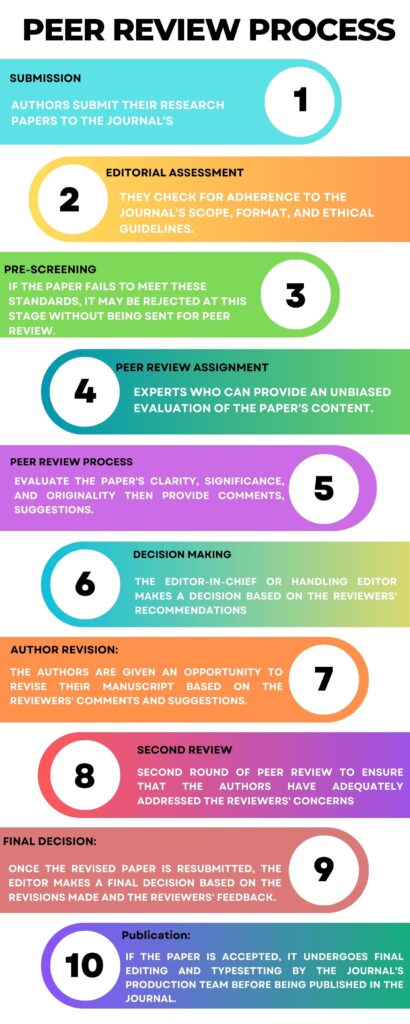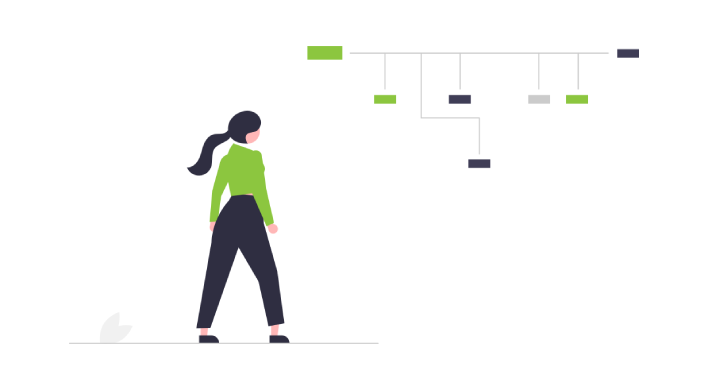Peer Reviewed Journals
Peer reviewed journals are crucial for academia and research. They ensure high-quality and credible content by subjecting articles to rigorous evaluation by experts in the field. This process helps maintain the integrity and validity of published research, promoting reliable knowledge dissemination.

Peer Reviewed Journals
In the ever-evolving academic landscape, the pursuit of credibility and impact is a constant endeavor. As researchers and scholars, we strive to contribute valuable insights to our respective fields, but how can we ensure our work reaches the right audience and stands up to scrutiny? The answer lies in the realm of peer-reviewed journals. These esteemed publications serve as the gateway to credibility and impact in the academic world, acting as a stamp of approval from experts in the field. By undergoing a rigorous review process, peer-reviewed journals ensure that only the highest quality research makes it to publication.
Not only does this process guarantee the validity and reliability of the research, but it also allows scholars to engage in meaningful conversations with their peers and contribute to the collective knowledge of their discipline. In this article, we will explore the significance of peer-reviewed journals and how they can elevate your academic career to new heights. Get ready to unlock the power of credibility and impact through the world of peer-reviewed journals.
Importance of Peer Reviewed Journals in Academia
Peer reviewed journals hold immense importance in the academic world. These journals act as a primary means of communication, allowing researchers to share their discoveries and add to the amount of information already in existence in their field. By publishing in peer-reviewed journals, scholars can demonstrate their expertise, receive recognition, and improve their professional reputation.
Moreover, peer reviewed journals serve as a platform for academic discourse, enabling researchers to participate in critical debates and work together with their peers. These publications have a strict review procedure for papers before they are accepted, making sure that the research is sound, valid, and makes a significant contribution to the field.
Publishing in a peer-reviewed journal not only adds credibility to your work but also increases its visibility. Many researchers and scholars rely on peer-reviewed journals to stay updated with the latest research in their field. Thus, publishing in these journals can broaden the audience for your work and increase its impact. Additionally, peer reviewed journals are often indexed by databases and search engines, making it easier for other researchers to discover and cite your work. Thus, by choosing to publish in peer-reviewed journals, you are maximizing the chances of your research being read, cited, and making a meaningful impact in your field.
Peer reviewed journal meaning
A reputable academic journal is a scholarly publication that verifies the quality and reliability of research papers through a thorough assessment process. Researchers who submit their manuscripts to these journals have their work evaluated by independent experts, referred to as peers or referees, who have specialized knowledge in the appropriate field.
The manuscript’s credibility, innovation, research approach, and impact were assessed during the peer review process. Reviewers provide constructive feedback to the journal’s editor, who then makes an informed decision on whether to accept, reject, or request revisions to the manuscript.
This process serves as a vital quality control mechanism, upholding the standards of academic research and ensuring that only high-quality and credible work gets published. In academia, peer-reviewed journals are widely regarded as trustworthy sources of information.
By undergoing peer review, researchers demonstrate their commitment to academic integrity and contribute to the advancement of knowledge in their respective fields. Overall, peer-reviewed journals play a crucial role in disseminating reliable research findings and fostering the growth of scholarly disciplines.
How Peer Reviewed Journals Ensure Quality and Credibility
One of the key reasons why peer-reviewed journals hold such high regard in academia is their commitment to ensuring the quality and credibility of published research. Unlike other forms of publication, peer-reviewed journals employ a stringent review process that involves multiple experts in the field critically evaluating each submission. This process acts as a filter, separating high-quality research from subpar or flawed work.
The peer-review process usually consists of multiple steps. After the submission of an article to a journal, it goes through an initial screening by the journal’s editors. Manuscripts that meet the journal’s scope and quality criteria are then sent to subject-matter authorities who are outside reviewers. These reviewers offer a comprehensive assessment of the study design, data analysis, interpretation of results, and the overall significance of the research in the field. They provide detailed feedback, suggestions for improvement, and recommend whether the manuscript should be accepted, revised, or rejected.
The feedback provided by peer reviewers is invaluable in enhancing the quality of the research. It helps authors identify any gaps or weaknesses in their work and make necessary revisions. This iterative process ensures that the final published version of the research is of the highest standard, contributing to the overall credibility and reliability of the journal. By subjecting research to such rigorous scrutiny, peer-reviewed journals uphold a standard of excellence and ensure that only the most robust and impactful research is disseminated
Benefits of Publishing in Journals with Peer Review
Publishing in Journals with Peer Review offers numerous benefits for researchers and scholars. Firstly, as mentioned earlier, it enhances your credibility and professional reputation within your field. By having your work accepted and published in a journal with peer reviewed, you demonstrate to your peers and the broader academic community that your research is of high quality and contributes to the advancement of knowledge. This can open up new opportunities for collaboration, invitations to conferences and seminars, and even career advancements.
Furthermore, Publishing in Journals with Peer Review can increase the visibility and impact of your research. As these journals are widely read and trusted by researchers in the field, your work is more likely to be discovered and cited by others. This not only helps to build your academic profile but also contributes to the overall knowledge base of your discipline. Additionally, when you publish in a reputable peer-reviewed journal, your research becomes part of the scholarly conversation, allowing you to engage with other scholars and contribute to ongoing debates and discussions.
Another benefit of Publishing in Journals with Peer Review is the potential for funding opportunities. Many funding agencies and institutions place high value on research that has been published in reputable journals. By having a track record of publishing in such journals, you increase your chances of securing funding for future projects and research endeavors. Moreover, Publishing in Journals with Peer Review can also enhance your chances of being invited to serve as a peer reviewer yourself, further contributing to the academic community and expanding your professional network.
Choosing the Right Journal for Your Research
Selecting the right journal to publish your research is a critical decision that can greatly impact the visibility and impact of your work. When choosing a journal, consider the following factors:
Relevance
Ensure that the journal is aligned with the scope and focus of your research. Publishing in a journal that specializes in your field will increase the likelihood of your work being read by the right audience.
Impact Factor
A measure of the typical number of citations a publication receives, the impact factor receives in a particular journal. Journals with higher impact factors are generally considered more prestigious and influential. However, it is important to note that impact factor should not be the sole criterion for choosing a journal, as it may vary across disciplines.
Visibility and Accessibility
Consider whether the journal is widely available and accessible to researchers in your field. Open-access journals, for example, make research freely available to the public, increasing its visibility and potential impact.
Publication Time
Take into account the average time it takes for articles to be published in the journal. Some journals have long publication pipelines, which may delay the dissemination of your research.
Peer Review Process
Research the journal’s peer review process and reputation for maintaining high standards. A transparent and rigorous peer review process is essential for ensuring the quality and reliability of published research.
By carefully considering these factors and conducting thorough research, you can make an informed decision about which journal is the best fit for your research.
The Peer Review Process Explained
The peer review process is the cornerstone of guaranteeing the reliability and quality of research published in peer reviewed journals. It is a rigorous evaluation process that involves multiple stages and experts in the field. Here is a step-by-step breakdown of the peer-review process:
Submission
Writers send forth their works to the journal, following the specified guidelines and formatting requirements.
Editorial Screening
The journal’s editors review the submission to ensure it meets the journal’s scope and quality criteria. Manuscripts that do not meet these criteria are often rejected at this stage.
Peer Review Assignment
The editor submits the paper to subject-matter experts from outside reviewers. Reviewers are often academics or researchers who are engaged in ongoing study in the topic.
Peer Review
The chosen reviewers provide the work a full evaluation, including its technique, data analysis, result interpretation, and overall impact on the field. They provide helpful criticism, recommendations for enhancement, and advice on whether the paper ought to be accepted, changed, or rejected.
Author Revision
If the document has to be changed, the authors are given the chance to do so in order to meet the reviewers’ suggestions and enhance the quality of their work.
Editorial Decision
Based on the reviewers’ feedback and the revised manuscript, the editor makes a decision on whether to accept, revise, or reject the manuscript. This decision is communicated to the authors along with the reviewers’ comments.
Final Publication
If the manuscript is accepted, it undergoes final formatting and editing before being published in the journal. The research is then made available to the academic community, contributing to the collective knowledge in the field.
It is worth noting that the peer-review process can vary slightly between different journals and disciplines. However, the core objective remains the same – to ensure the quality, reliability, and impact of published research.
Tips for Getting Your accepted for publication in a peer reviewed journal
Getting your accepted for publication in a peer-reviewed journal can be a challenging process. However, by following these tips, you can increase your chances of success:
Choose the right journal
As discussed earlier, carefully select a journal that is aligned with your research and has a reputation for publishing high-quality work.
Read and follow the author guidelines
Familiarize yourself with the journal’s author guidelines and adhere to them closely. Ensure that your manuscript meets the specified formatting and submission requirements.
Craft a compelling title and abstract
The title and abstract are the first elements that reviewers and readers encounter. Make them concise, clear, and engaging, highlighting the significance and novelty of your research.
Structure your paper effectively
Present your research in a logical and organized manner. Use headings, subheadings, and clear transitions to guide the reader through your work. Ensure that your arguments are well-supported by evidence and that your conclusions are justified.
Address reviewer comments constructively
If your manuscript requires revisions, carefully consider the feedback provided by the reviewers. Address each comment in a respectful and constructive manner, making necessary revisions to improve the quality of your research.
Proofread and edit your manuscript
Watch out for punctuation, grammatical, and spelling mistakes. Verify your writing. is clear, concise, and free from unnecessary jargon. Consider seeking feedback from colleagues or professional editors to improve the overall clarity and coherence of your manuscript.
Be patient and persistent
Rejections are common in the world of academic publishing. If your paper is rejected, carefully review the reviewers’ comments, make necessary revisions, and consider submitting to a different journal. Persistence and resilience are key qualities for success in this process.
By following these tips and continuously improving your research and writing skills, you can increase your chances of getting your paper accepted in a peer-reviewed journal.
Common Challenges in the Peer-Review Process and How to Overcome Them
The peer-review process is not without its challenges. Authors often face various obstacles that can hinder the publication of their research. Here are some common challenges and strategies to overcome them:
Rejection
Receiving a Rejection might be discouraging, but it’s crucial to keep in mind that it’s a process. Take the reviewers’ comments constructively, make necessary revisions, and consider submitting to a different journal.
Reviewer Bias
Reviewers may have their own biases and preferences, which can influence their evaluation of your work. Remember that the peer-review process involves multiple reviewers, and their feedback should be considered collectively. If you feel that a reviewer’s comments are unjustified or biased, you can politely address your concerns with the editor.
Delays
The peer-review process can often be time-consuming, leading to delays in the publication of your research. Be patient and proactive in following up with the journal, but also consider setting realistic expectations regarding the timeline.
Conflicts of Interest
Reviewers may have conflicts of interest that can impact their objectivity. If you suspect a conflict of interest, you can raise your concerns with the editor, who can ensure that the review process remains fair and unbiased.
Revision Fatigue
The process of addressing reviewer comments and making revisions can be exhausting. Take breaks, seek support from colleagues or mentors, and approach the revisions systematically to avoid becoming overwhelmed.
You can overcome these obstacles by being aware of them and using tactics to do so. navigate the peer-review process more effectively and increase your chances of successful publication.
The Impact of Publishing in Journals with Peer Review on Your Academic Career
Publishing in Journals with Peer Review has a profound impact on your academic career. It enhances your credibility and professional reputation within your field, making you a recognized expert in your area of research. This can open up numerous opportunities for collaboration, invitations to conferences and seminars, and even job prospects.
Furthermore, Publishing in Journals with Peer Review allows you to contribute to the collective knowledge of your discipline. Your research becomes part of the scholarly conversation, enabling you to engage with other scholars, challenge existing theories, and propose new ideas. This not only advances your own research but also contributes to the overall growth and development of your field.
Publishing in Journals with Peer Review also increases the visibility and impact of your research. As your work is read and cited by other researchers, it gains recognition and influence within the academic community. This can lead to further citations, collaborations, and invitations to contribute to special issues or edited volumes.
Moreover, Publishing in Journals with Peer Review can have implications for funding and promotion. Many funding agencies and institutions place high value on research that has been published in reputable journals. By having a track record of publishing in such journals, you increase your chances of securing funding for future projects and research endeavors. Additionally, the quality and impact of your published research can be considered in promotion and tenure decisions, further advancing your academic career.
In summary, Publishing in Journals with Peer Review has a transformative effect on your academic career. It enhances your reputation, increases the visibility and impact of your research, and opens up new opportunities for collaboration and advancement.
Resources for Finding and Accessing Peer Reviewed Journals
Finding and accessing peer-reviewed journals can sometimes be a daunting task, especially for researchers who are new to the field. However, there are several resources available that can assist you in this process:
Databases
Academic databases such as PubMed, Web of Science, and Scopus are excellent resources for finding peer-reviewed journals. These databases allow you to search for articles based on keywords, authors, or specific journals.
Library Resources
University and institutional libraries often subscribe to a wide range of peer-reviewed journals. They provide access to these journals either in print or electronically. Consult your library’s catalog or website to explore the journals available to you.
Open-Access Journals
Open-access journals make research freely available to the public, eliminating the barrier of subscription fees. Platforms such as DOAJ (Directory of Open Access Journals) provide a comprehensive list of reputable open-access journals across various disciplines.
Reach out to us at www.saairatechnologies.com or give us a call at 7604897174 if you need assistance with the Peer Reviewed Journals
Our strengths
Guarantee of Service
PhD in Creativity
At Saaira Technologies, our mission is to provide a level of service unparalleled by any other organization. We take immense pride in our team of highly skilled and experienced pro-writers. We are excited to declare that, at Saaira Technologies, we never compromise when it comes to quality. Our commitment to excellence sets us apart in the industry.
Assurance and Privacy
At Saaira Technologies, we guarantee that your research and personal information will be treated with utmost confidentiality. We are committed to maintaining strict privacy and ensuring that your data is securely handled for internal purposes only. Your trust is of paramount importance to us, and we take every measure to safeguard your information.
24/7 Service Assistant
At Saaira Technologies, our team of experts is readily available round the clock on Facebook, WhatsApp, and Email, ensuring uninterrupted support and assistance. We operate 24 hours a day, 7 days a week, allowing clients to conveniently connect with us at any time. Your satisfaction is our priority, and we are committed to providing timely and reliable service.
Why choose us?
PhD help technical experts are very friendly and always ready to hear from you. Our experts are available at any stage of your PhD work.
The project you submit to us will be a hidden treasure and it will be confidential and maintained very secretly.
PhD help projects are always cost effective but we assure you that this will not affect the quality of your work.
PhD help developers are well experienced and professionals in their particular field. They are very eager and always on duty. They are readily available to help you in any situation and time. Our experts are available on the shop floor always ready to help you at any point of your PhD you are stuck.
Teams of Saaira Technologies
Business Development Executives


Data Scientist
Language Editing Division


Department of Journal Publications
What Sets Us Apart from The Competition?

